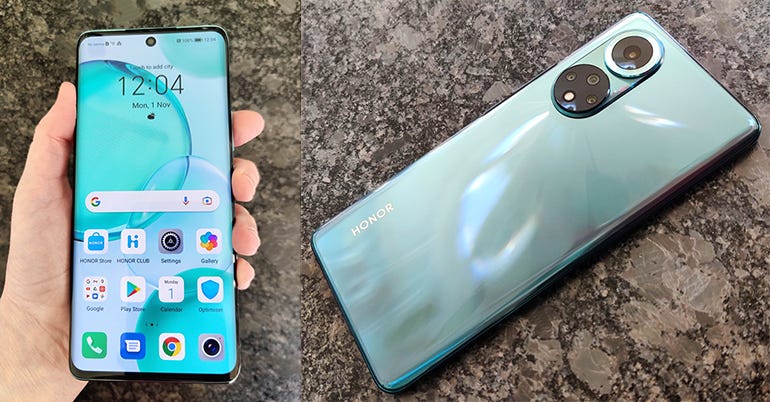Honor 50 review: Google Mobile Services put this 5G handset on the mid-range map | ZDNet
The Honor 50, in Emerald Green.
Image: Honor
Honor began life as Huawei’s budget brand, and as such it suffered from the same inability to use Google Mobile Services following action taken against Huawei in the US. Honor is now independent of Huawei, and so can once again include full-featured Android with its handsets, including Google Mobile Services. The Honor 50 is the first phone to benefit from this new independence.
Although it’s no longer Huawei’s budget brand, Honor remains true to that ethic, delivering high-end specifications in a mid-priced phone. There are two configurations. The top-end 8GB RAM/256GB storage model costs £529.99 (inc. VAT), while my 6GB/128GB review unit costs £449.99 (~$614). At the time of writing, the latter came with an Honor MagicWatch 2 (offer ends at 23:59 on November 11).
Like
- Attractive, thin and light design
- Google Mobile Services
- 120Hz OLED screen
- 66W fast charging
- Neat dual-camera video option
Don’t Like
- Not all of the cameras impress
- Average speaker
- No IP rating or wireless charging
It is obvious that the Honor 50 aims to look and behave like a premium handset. It’s very nicely designed with a slim frame and screen that curves into the long edges. At just 7.78mm thick and weighing 175g the phone slots into a pocket easily, and sits comfortably in the hand. Its 6.57-inch screen fits into a chassis measuring 160mm tall and 73.76mm wide. It’s a smart-looking phone, but like many sub-flagship-class handsets it lacks an IP rating for dust and water resistance.
The backplate is shiny, smooth and reflective, and proved adept at sliding off the arm of my sofa unless I used the transparent bumper provided by Honor. That stopped the slippage, but also hid the Emerald Green colour, which is one of four choices. Standard block colour finishes are also available as Frost Crystal and Midnight Black, but there’s also Honor Code – in which the company branding is writ large in shiny silver tones.

The 6.57-inch Honor 50 has a curved OLED display with a maximum refresh rate of 120Hz. It runs Android 11 and MagicUI 4.2 on Qualcomm’s Snapdragon 778G 5G chipset. Our review unit had 6GB of RAM and 128GB of internal storage.
Images: Sandra Vogel / ZDNet

Honor 50 colours (clockwise from top left): Midnight Black, Emerald Green, Honor Code, Frost Crystal.
Images: Honor
Whatever colour you go for, it’s impossible to miss the large camera lozenge that hugs one corner of the phone’s back. It protrudes a fair way and, inevitably given its location, caused the phone to rock around and clatter when the screen is tapped with the phone sitting on a desk or table. How long will it be before the horizontal camera bar design of the Google Pixel 6 is adopted more widely? It’s a pertinent question not only in terms of ergonomics in general, but because the £599 Pixel 6 is a key competitor for the Honor 50.
The edges of the Honor 50 harbour no surprises. The power button and volume rocker sit on the right edge, the left and top edges are clean, while the bottom edge has a speaker grille, a caddy for two SIMs (this is a 5G phone, by the way) and a USB-C port. There’s no 3.5mm jack, but Honor does bundle a wired USB-C headset which delivers reasonable quality sound. The phone’s speaker is a little lacklustre, being short on bass tones and high on treble, although there’s no distortion even at top volume.
The OLED screen is one of the Honor 50’s standout features. At 6.57 inches it’s large, and while the top and bottom bezels and centrally located selfie camera cut-out are very visible, they don’t detract from the pleasure of using it. The long edges are curved. This is usually a premium feature, so it’s interesting to see it make an appearance here. Crucially, I didn’t suffer from false-positive screen taps that can be generated simply by holding a phone with this style of screen. For the record, we calculated the screen to body ratio to be 89.6%.
With resolution of 1,080 by 2,340 pixels (392ppi), content is sharp and clear on-screen. There’s plenty of brightness, a maximum refresh rate of 120Hz, 300Hz touch-sampling rate and support for 100% of the DCI-P3 colour gamut. The screen refresh rate can be set to adjust dynamically, or to stick at 60Hz, both of which can help save battery life, although I’d steer away from fixing it at 60Hz if this were my phone.
The Honor 50 is powered by Qualcomm’s mid-range Snapdragon 778G 5G chipset, which supports Wi-Fi 6 as well as 5G. My review unit was the £449 6GB RAM model with 128GB of storage, of which 21GB was used out of the box leaving 107GB to be filled with user content.
Benchmark performance was impressive with Geekbench 5 reporting scores of 775 (single core) and 2885 (multi core). This is slightly better than the £399 8GB/128GB OnePlus Nord 2, which scored 733 and 2517 respectively in our review. The Nord 2 is based on a non-Qualcomm chipset: MediaTek’s Dimensity 1200-AI.

The Tools folder, with a selection of Honor apps.
Image: Sandra Vogel / ZDNet
Android 11 comes complete with Google Mobile Services, to which Honor adds its MagicUI 4.2 overlay and a bunch of applications. Those who dislike third-party bloatware may be pleased by the absence of big-name apps, but there’s plenty of Honor-branded software.
There is a separate Gallery app that complements Google’s own Photos, a Notepad which people might like to use in preference to Google Keep, a file manager and, in a folder called Tools, a range of additional apps: Contacts, Weather, Calculator, Recorder, Mirror, Compass, SIM toolkits for each of the two SIMs, and Device Clone for transferring data from an old device.
There is also the Honor store, which is a blatant attempt to get users to buy more Honor gear, and Honor Club, which is a marketing heavy app that, among other things, provides access to wallpapers and themes. Both can be either dropped into the Tools folder or uninstalled if not required.
The selfie camera is a 32GB f/2.2 unit with a bokeh button on the viewfinder that makes it easy to achieve a blurred background. There are four cameras at the back, the main one having a 108MP sensor and an f/1.9 wide-angle lens. This is joined by 8MP f/2.2 ultra-wide, 2MP f/2.4 macro and 2MP f/2.4 depth cameras. Results are mixed. I found that the selfie and main cameras produced very passable photos, but was less impressed with the ultra-wide lens. The macro lens is fixed focus and not particularly useful, while the depth sensor is really just about bokeh.

Multi-video recording using the main and ultra-wide angle cameras.
Image: Sandra Vogel / ZDNet
Probably the key feature of the Honor 50’s camera setup is the multi-video option found on the shooting mode ribbon. This is why the handset is being marketed in part as a vlogger’s phone. It can take video from the selfie and main camera at the same time, or from the main and ultra-wide cameras, or in a picture-in-picture setup with the selfie view as a thumbnail.
The Honor 50 is powered by a moderate-sized 4,300mAh battery. Under the PCMark for Android Work 3.0 battery life test this kept the handset kept going for 11 hours and 26 minutes, which is OK but considerably less than the 15 hours 53 minutes achieved by the OnePlus Nord 2, for example. That said, when I asked it to play YouTube video for three hours from a full charge, it lost just 7% over that period.
The 66W charger was speedy: starting at 16%, the battery rose to 46% after 10 minutes, 71% after 20 minutes, 87% after 30 minutes, and 98% after 40 minutes. Unfortunately, as with many mid-range handsets, there’s no wireless charging.
Conclusions
With Google Mobile Services on-board the Honor 50 is a respectable — if not show-stopping — mid-range 5G handset. The design is pleasing, the curved OLED screen is very good, and the 120Hz refresh rate welcome. The vlogging camera features might not appeal to everyone, but they are fun to experiment with, and we applaud the absence of big-name third party bloatware.
RECENT AND RELATED CONTENT
Trade war restrictions force Huawei to sell off Honor business
Honor 9X Pro review: An affordable large-screen handset with a major drawback
Honor MagicWatch 2 review: Solid on health and fitness, but light
Best cheap 5G phone 2021: Affordable 5G smartphones
Best Android phone 2021: Top expert picks
Read more reviews
For all the latest Technology News Click Here
For the latest news and updates, follow us on Google News.

